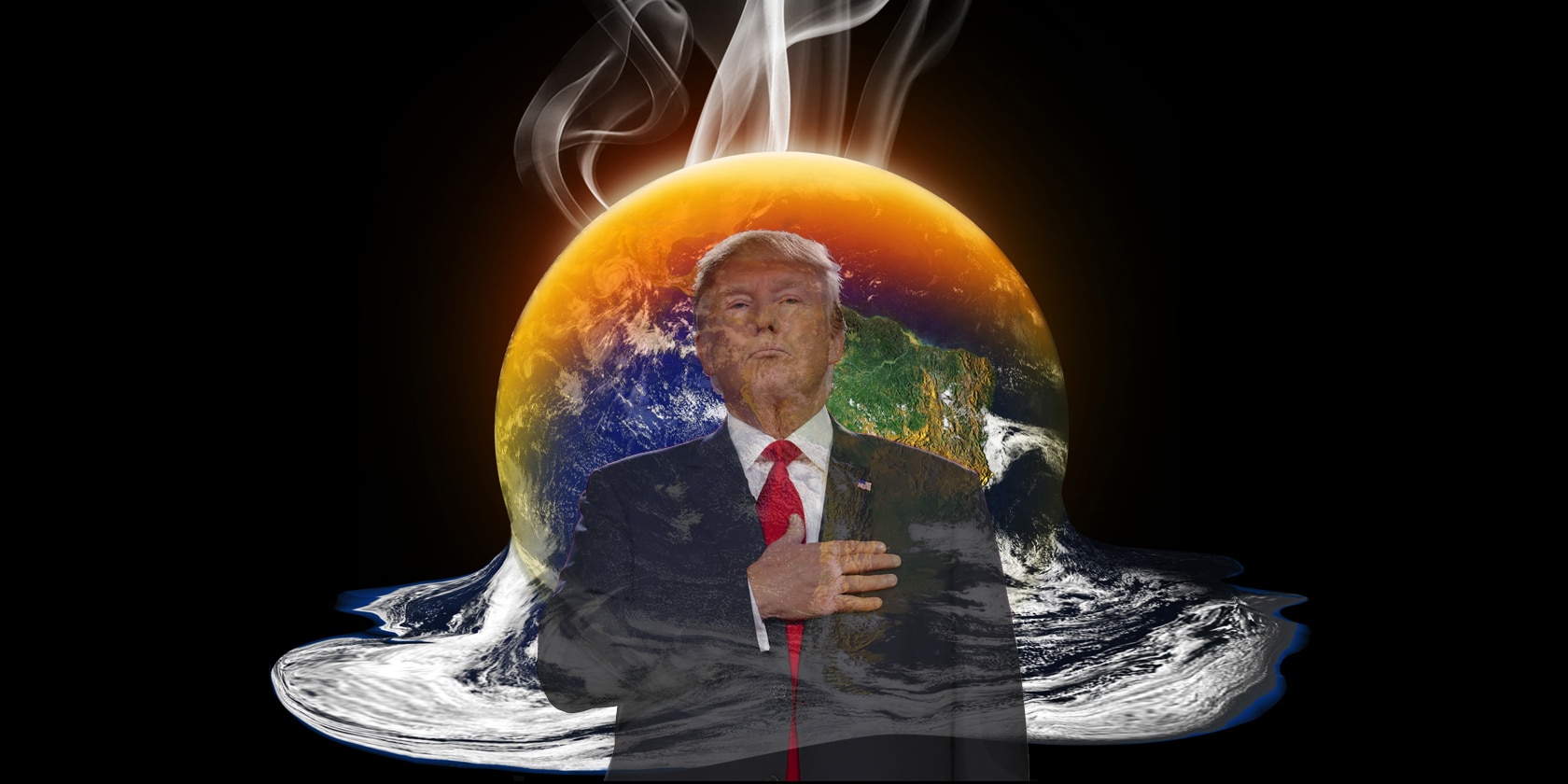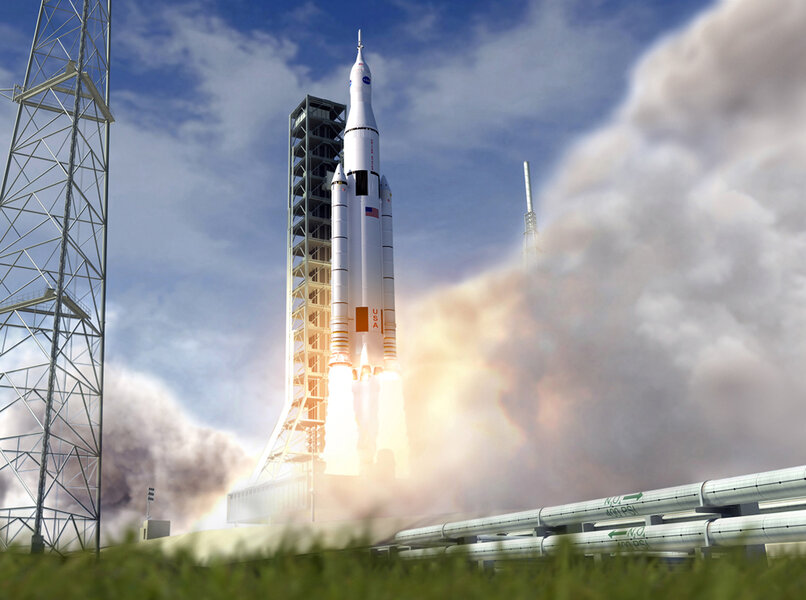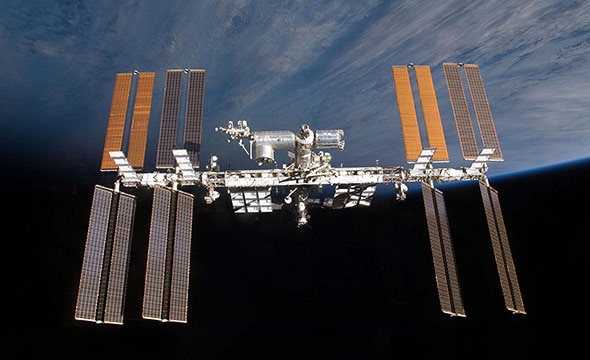Create a free profile to get unlimited access to exclusive videos, sweepstakes, and more!
The White House budget: Defunding science

Yesterday, the White House released its budget request for Fiscal Year 2019, and if you've paid even the slightest attention to politics over the past year or so you can guess how this goes.
Hint: It's a disaster. Now, before I get rolling here it's important to understand what this thing really is: a request. The actual numbers are decided by Congress, first in the House, then the Senate, then they hammer out a compromise, and then it's given to the President to sign or veto. The original request never really survives this process intact, though parts of it can and do.
Beyond that, this request is really a mission statement, a declaration of priorities for the President and his Administration. And reading it over it's clear: Their priority is to declare a war on science.
Well, pretty much a war on everything that makes America good and great, but science in general seems to take the hatchet blade pretty hard. The cuts requested to science programs are as devastating as they are irrational. The Environmental Protection Agency, Centers for Disease Control, and the National Science Foundation all see brutal cuts to their funding. I sure hope these cuts to the EPA won't affect Administrator Scott Pruitt's travel comfort! And cutting the CDC is just bizarre; we're in the middle of a flu epidemic that's killing 4,000 Americans every week. I seem to remember Trump stoking fears of Ebola, too, so cutting the CDC seems particularly hypocritical.
But I'll leave that for others to dissect. Me being who I am, and you being who you are reading my blog, let's see what's in this for NASA.
As always, there's good news and bad news. For example, some good news is that Mars 2020 lander and the (amazing) Europa Clipper are continued, and the budget request establishes a planetary protection program against potential asteroid impacts (I'll be very curious to learn more about that if that's given the Congressional go-ahead). There are lots of details and specifics, including commercial space efforts and the like, but for now I want to keep this at the overview level.
To wit: The overall budget request for NASA is $19.9 billion dollars (the White House version says $19.6, but it's a few days old and an additional $300 million was allocated to NASA last week). That's a slight increase from the FY18 request (a few percent) but slightly less than the FY17 request. Given the rate of inflation, this is functionally a flat budget.
At least it's not a cut overall, but that's faint praise. And when you look at specifics, well, it's bad. The White House released a document called "An American Budget: Major Savings and Reforms", which is just as Orwellian as it sounds. It outlines the big changes to each part of the government, including NASA. It lists three major cuts for the space agency:
First, to no one's surprise, the budget request axes five Earth science missions, all of which in part or whole monitor the planet's climate (one of them, the Radiation Budget Instrument, had already been canceled in January though). Trump's denial of climate science is as clear as it is wrong. But that is translating to a devastating cut to one of NASA's most important missions: The study of our own planet. Climate change induced by global warming is a threat in every sense of the word, so cutting these missions is a huge mistake.
Second, it outright cancels WFIRST (the Wide-field Infrared Survey Telescope) mission entirely. WFIRST is a Hubble-class space mission, designed to observe wide areas of the sky in the infrared (unlike James Webb Space Telescope, which has a narrow field of view). This mission was rated as a top priority in the Decadal Survey of astronomers, and is in the planning stages right now (with a launch date of sometime in the 2020s). Weirdly, one reason the budget request gives for cutting it is "[it] would have required a significant funding increase in 2019 and future years…" Yes, that's what happens when you want to design, build, launch, and use a space telescope. That's NASA's purpose. But, ignoring the scientists again, the request says it's "not a priority for the Administration." That's… well, frankly, again that's a huge mistake.
Third, the request zeroes out the funding for NASA's Office of Education. This office centralizes NASA education effort, including the distribution of grants to schools, Universities, and museums. It's also, as the Washington Post put it last year when Trump tried to kill it that time, "popular with Congress, astronauts and kids" so eliminating it is a bad move politically. I'll note that this will result in a savings of $100 million, which the request says will be redirected to "NASA's core mission of exploration." While that may sound like a lot of money, that won't actually cover much in terms of exploration. It's ridiculous the request says that; it's like taking your kid's allowance and putting it toward your mortgage. Yeah, it helps by definition, but how much in reality, and how much does it hurt whom it was taken from?
There's more, of course. The request "fully funds" the Space Launch System (NASA's huge rocket) and Orion crew capsule for about $3.7 billion (compare that to how much the education office costs), and I'm on record multiple times as firmly opposing this. However, as I pointed out last year, SLS is going to get funded no matter what (at least until it proves beyond a doubt to be a needlessly colossal drain on NASA's budget) so I have to accept this. Doesn't mean I have to like it though.
It also discusses NASA pulling out of the International Space Station by 2025. Although I was not a big supporter of ISS back in the day, I have since changed my mind on it, and I think dropping out in the next few years is a mistake. My colleague Eric Berger at Ars Technica has some information on that, including the point that NASA doesn't have anything to follow up with after the ISS. The Washington Post reports that an internal NASA document shows Trump wants to turn the ISS into more of a commercial venture, but why and how, and even if the commercial sector would bite, are very unclear.
There's been talk of pulling out for a while now, but I think it's a mistake. We have this phenomenal asset, and we should be using it. Yes, it's expensive, but the answer to that is easy: Increase NASA's budget. NASA costs us about half a penny on the dollar, and it's one of the clearest and best symbols of American leadership and achievement on (or off) the planet. Increasing the budget is no hardship; note that the Department of Defense in this budget gets an extra $80 billion over the 2017 budget, which means the military budget increase is 4 times NASA's entire budget! I have nothing against the necessity of the DoD in general — there are bad guys out there — but this makes it clear it's not a matter of finding the money, it's a matter of the will to do it.
Finally, the request discusses lunar exploration. I am a firm supporter of this, if done correctly. But it's hard to say if that's happening. Again, Eric Berger has more on this. There are steps outlined in the NASA budget overview, but it notes the timeline is "tentative" and it will be worked out further in FY19. It lists humans reaching the Moon in 2023, but that feels a tad ambitious. Once (if) SLS gets off the ground I'll have more to say about that.
Oddly, as Berger points out as well, it doesn't mention international partners, which are critical (though probably anathema to the currently nationalist White House). If we ever do get humans to the Moon under this plan, it'll take a while; likely, and weirdly, under this plan it'll happen long after Trump is out of office.
By the by, I'll mention that NASA still doesn't have an Administrator. Associate Administrator Robert Lightfoot has been Acting Admin since Charles Bolden stepped down last year. Rep. Jim Bridenstine has been nominated (and oh boy do I have issues with him) but has yet to be confirmed by the Senate. It feels very odd indeed to be discussing NASA budgets when it doesn't have anyone officially at the helm.
So.
Time and again, Trump and his Cabinet seem to think that the United States is a coffer to pilfer, and not a nation to support and foster. Even without context this budget is bad, but given what we know about their behavior, there's no reason to think this budget has been submitted in good faith.
The good news, such as it is, is as I said above Congress has to approve this, and it's extremely unlikely to survive intact. Given too that the GOP is running scared right now about the mid-term elections, and this budget will hurt a lot of people locally, I'd hope that Congresspeople on both sides of the aisle will take a very critical eye to it.
I can't believe that I have to hope for Congress — this Congress — to save the day, but it's happened many times before (including under President Obama, who also had some really strange ideas about NASA's budget). But, apparently, that's the state of the union these days.
And as always, remember that those mid-terms are coming up. A lot can and will happen between now and then. But if things go well, a lot will happen right after, too. Let's hope.




























